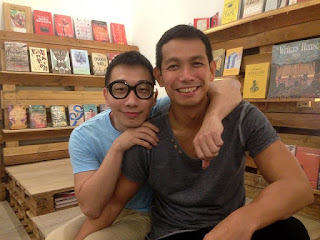Joseph O. Legaspi's "Imago"

The debut poetry collection of Legaspi, a friend of mine, is about rites of passage, in particular, the rite of circumcision, which many of these poems attempt to circumscribe. The title-poem begins:
As soon as we became men
my brother and I wore skirts.
We pinched our skirt-fronts into tents
for our newly circumcised penises, the incisions
prone to stick painfully to our clothing.
As these opening lines show, the movement of the book is narrative, the motor is memory, the voice gently humorous, and painfully aware, likeable. This poem rises to a meditation on how women help men pass their initiation into manhood. The delight here, as elsewhere in this book, lies in the specificity of local details. After expressing his preference for his "sister's plaid skirt," and his brother's choice of a grandmother's one, "flowers/ showering down his ankles," the speaker describes the mother's ministrations to a son's agonizing manhood.
As a cure, my mother boiled
young offshoorts of guava leaves.
Behind the streamline of hung fabric,
I sat on a stool and spread
before a tin washbasin. My mother bathed
my penis with the warm broth,
the water trickling into the basin like soft rain on our roof.
She cradled my organ, dried it with cotton,
wiping off the scabs melted by the warmth,
and she wrapped it in gauze, a cocoon
around my caterpillar sex.
"Imago" means both a sexually mature insect, and and an idealized mental image of the self or a parent, formed in childhood and persisting unconsciously into adulthood. It is an apt name for this book, which treats so tenderly the injuries and ideals of growing up.


Comments